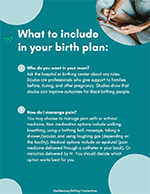I Want to Create a Birth Plan
A birth plan is a plan for how you want to experience labor and delivery of your child. While your plans may change during the process, planning ahead of time and sharing your plans with your provider and support team can help you and your support team advocate for your preferences during labor and delivery. Recognize that in many obstetric practices these days, the individual provider performing your prenatal care may or may not be the same provider delivering your baby. Also, what seems you and an individual provider agree on, may not always be a comfortable plan for the provider staffing the delivery.
Some things to include in your birth plan
-
Who you want in the room with you
Check with your hospital or birthing center on any restrictions. Doulas are professionals who provide support to families before, during and after pregnancy. Research has shown that use of doulas improves several outcomes for Black birthing people. -
How you want to manage pain
You may choose to manage pain with or without medication. Non-medication options include walking, breathing, using a birthing ball, massage, taking a shower, and using laughing gas. Common medication options include epidural, which is pain medication given through your back or opioids like morphine, nalbuphine, butorphanol, meperidine, fentanyl, which are given intravenously (IV). You should decide which option works best for you.
Types of birthing team members
-
OB/GYN
An Obstetrician-Gynecologist (OB/GYN) is a physician that specializes in women’s health. Although most OB/GYN’s have both trainings there is a difference. Obstetricians specialize in pregnancy, childbirth, and postpartum care while Gynecologist specialize in female reproductive health. These physicians have gone through medical school, residency, and specialty training. They will conduct prenatal check-ups, ultrasounds, blood work, etc in addition to consulting with the patient to create birth plans and discuss pain management. After baby is born, new moms should see their OB/GYN within 6 weeks of birth or as advised by their OB/GYN for postpartum care. -
Midwife
A midwife does not go through medical school but there is specialty training. A midwife is usually seen for an at-home birth where they care for the pregnant parent and their baby. Most insurances will cover midwifery or provide reimbursement for care. There are different kinds of midwives as well. A Certified Professional Midwife (CPM) works in the home and birthing center while Certified Midwives (CM) and Certified Nurse Midwives work in these same places in addition to the hospital. CNM’s have a Bachelor of Science in Nursing as well as medical nurse training that allows them to do medical procedures like surgical abortions and assisting with C-sections. -
Doula
A Doula serves as a patient advocate for pregnant mothers in the delivery room as well as check-ups in addition to providing guidance and emotional support for parents through labor and delivery. There are several different types of doula as well: postpartum, full spectrum, and death doulas. Doula’s are not typically covered under insurance but some states will cover doula care through Medicaid. -
In general, all three of these birthing team members can work together to ensure you have a safe, healthy, pleasant birthing experience custom to your physical and emotional comforts.

"What to Include in Your Birth Plan" by Mecklenburg Birthing Connections (pdf)
Download Now
